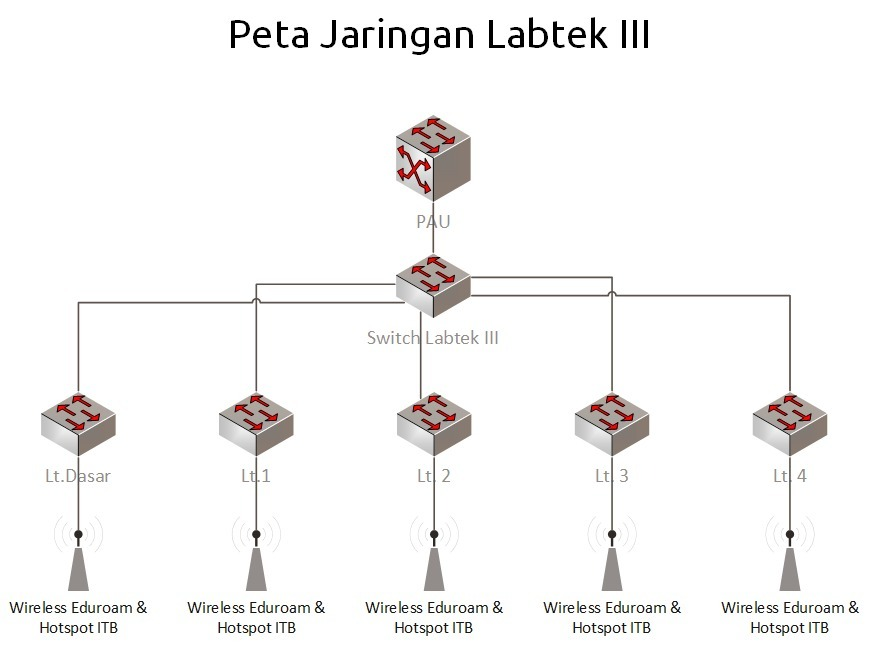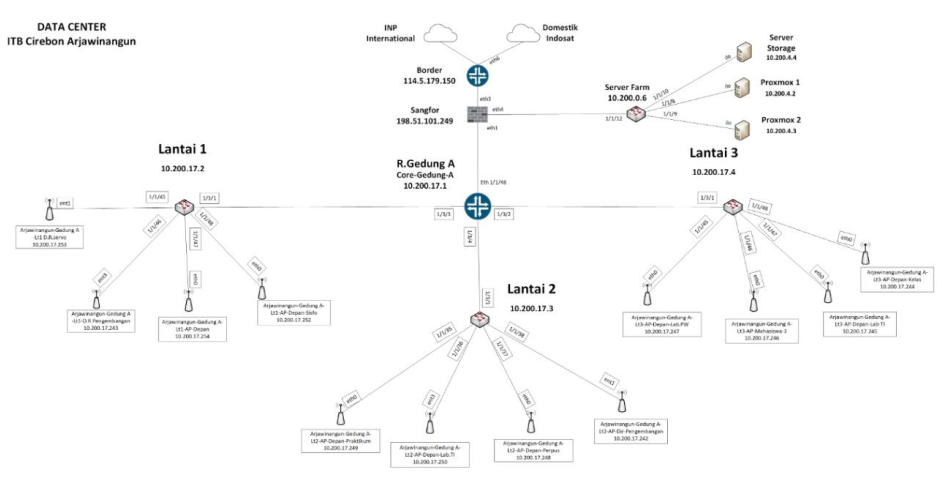Computing Facilities
The five study programs in Labtek III share computing facilities (computers, software, and internet access). In total, the Labtek III Building houses 302 computers. Meanwhile, at the Jatinangor Central Library, Industrial Engineering has 35 computer units. The specifications and locations of these computers can be seen in Tables 14.6 and 14.7. These computers are routinely used for classes that require them. In addition, the available computers can also be used by students to work on their undergraduate final projects/theses.
Table 6. Computer Specifications Accessible to the ITB Industrial Engineering Program
| Computer Type | Specifications | |
|---|---|---|
| A | All in one Desktop | Prosesor: Intel® Core i5 (3.40 GHz, 6M Cache) |
| RAM: 4GB DDR3 | ||
| Hard drive: 1TB Serial ATA, 7200RPM | ||
| Monitor: 20 LED | ||
| B | All in one Desktop | Prosesor: Intel® Core i7 (3.10 GHz, 8M Cache) |
| RAM: 8GB DDR3 | ||
| Hard drive: 1TB Serial ATA, 7200RPM | ||
| Monitor: 23 LED | ||
| C | All in one Desktop | Prosesor: Intel® Core i7 (4.10 GHz, 8M Cache) |
| RAM: 8GB DDR 4 | ||
| Hard drive: 1TB Serial ATA, 5400RPM | ||
| Monitor: 23 LED | ||
| D | All in one Desktop | Prosesor: Intel® Xeon E5 (Hexacore 2.0 GHz, 15M Cache) |
| RAM: 4GB DDR3 | ||
| Hard drive: 1TB Serial ATA, 7200RPM | ||
| Monitor: 19 LED | ||
Table 7. Locations of Computers Accessible to the ITB Industrial Engineering Program
| No. | Location | Computer Type | Total |
|---|---|---|---|
| 1 | Production Systems Lab | B / D | 20 / 4 |
| 2 | Innovation & Enterprise Systems Development Lab | B / D | 20 / 4 |
| 3 | Work Systems & Ergonomics Lab | B / D | 20 / 4 |
| 4 | Information & Decision Systems Lab | B / D | 20 / 4 |
| 5 | Industrial Systems Planning & Optimization Lab | B / D | 20 / 4 |
| 6 | Multimedia Lab 1 | B | 24 |
| 7 | Multimedia Lab 2 | B | 40 |
| 8 | Multimedia Lab 3 | B | 39 |
| 9 | Multimedia Lab 4 | A | 45 |
| 10 | Multimedia Lab 5 | A | 34 |
| 11 | Computer Lab 1 Arjawinangun | C | 22 |
| 12 | Computer Lab 2 Arjawinangun | C | 13 |
The ITB Industrial Engineering Program holds licenses for several essential engineering, mathematics, statistics, and simulation software for teaching, administration, and research purposes. Some licenses (e.g., operating systems) are available as institutional licenses, while others are purchased by the study program or individually by faculty members for their respective courses. Table 8 lists the software accessible to ITB Industrial Engineering faculty and students. There are two types of software licenses: institutional (used across many faculties at ITB) and educational (used by specific faculties or study programs). The Directorate of Information Systems and Technology (DSTI) ITB manages all institutional licenses.
Table 8. List of Software Accessible by ITB Industrial Engineering
| No. | Nama Perangkat Lunak | Deskripsi |
|---|---|---|
| 1 | Microsoft 365 | Includes Operating Systems (Server & Client), Office Suite (Word, spreadsheet, database, etc.), Programming Software (C++, .NET, etc.), Teams |
| 2 | Matlab | Mathematical modeling software |
| 3 | Minitab | Statistical analysis software |
| 4 | Zoom | Online conferencing software |
| 5 | Tableau | Data visualization software |
| 6 | Adobe Creative Cloud | Graphic design software |
| 7 | Ms Project | Project management software |
| 8 | Ms Visio | Vector graphics software |
| 9 | 3DSSPP | Ergonomics software |
| 10 | Solidworks edu | Simulation software |
| 11 | Lingo 18,0 | Optimization software |
| 12 | Promodel Student 2016 | Simulation software |
| 13 | Dev-Pascal | Programming software |
| 14 | GPSSH | Simulation software |
| 15 | Arena v15.1 | Simulation software |
| 16 | XAMPP 7.3.11 | Database software |
| 17 | Visual Studio v17.0 | Programming software |
| 18 | R4.1.2 | Programming software |
| 19 | RStudio Desktop 2021 | Programming software |
The network system in Labtek III Building is connected to ITB’s main network managed by DSTI. DSTI is also responsible for managing ITB’s main servers (official ITB and faculty websites, DNS, gateway, email servers, etc.), including IP addresses for all study programs at ITB. For academic and research purposes, ITB is currently connected to the internet through international and IIX networks, both with a bandwidth of 2250 Mbps. ITB is also connected to the TEIN R&D network with a speed of 622 Mbps and a backup network of 500 Mbps. This internet is distributed at an access layer speed of 10 Gbps. Meanwhile, the internet network in Arjawinangun is provided by Indosat with a speed of 100 Mbps. Figures 1 and 14.2 show the network topology in Labtek III and Multifunction A Arjawinangun.
Figure 1. Computer Network Topology at ITB Industrial Engineering
Figure 2. Network Topology at Arjawinangun Campus
To access internet facilities, ITB academic community members must register with DSTI ITB to obtain a Single Sign-On (SSO) account. This account can be used to access all ITB services. Students can access the internet for free through two services provided by ITB: ITB Hotspot and eduroam. The ITB Hotspot service has a limit of 10 GB/day, which is considered sufficient since local data transfer (download/upload) is not counted. Meanwhile, the eduroam wireless service, with access points spread across ITB campuses, can be used without internet quota limits. At Arjawinangun Campus, internet is provided by Indosat and the eduroam network, which allows access to internal/external sites without account authorization.
ITB, through DSTI, provides a large computer laboratory called ComLabs with a capacity of 150 students at a rate of Rp1,500/hour. ComLabs is also used for the Information Technology Introduction course (KU1071) practicum for TPB students. In addition, computer rooms at ITB’s central library can also be used for internet browsing at the same price. These facilities are available during working hours from 09:00–20:00. Based on historical data, these facilities are sufficient to serve all ITB students.
The ITB Industrial Engineering Program, together with 4 other study programs in Labtek III, provides Wi-Fi access points inside and around the Labtek III Building to access ITB Hotspot or eduroam services. By using the ITB Hotspot service, students can access program websites, academic administration systems, and other local systems without account authorization. Authorization is only required to access systems outside ITB. Meanwhile, using the eduroam network, students do not need account authorization to access either local or external systems.
ITB also provides several platforms for all study programs to support academic activities:
-
SIX (akademik.itb.ac.id) → Academic Information System for lecturers and students.
-
Edunex (edunex.itb.ac.id) → Learning Management System (LMS) developed by DSTI ITB to organize lectures.
-
E-office (e-office.itb.ac.id) → Platform for managing correspondence within ITB.
-
Oracle → Platform used for financial management.
In addition, ITB’s internal internet system is also used for communication between academic staff and between staff and students. Digital communication among academic staff is facilitated through the internal webmail service, while communication between staff and students can be done via internal webmail or the Edunex platform.


